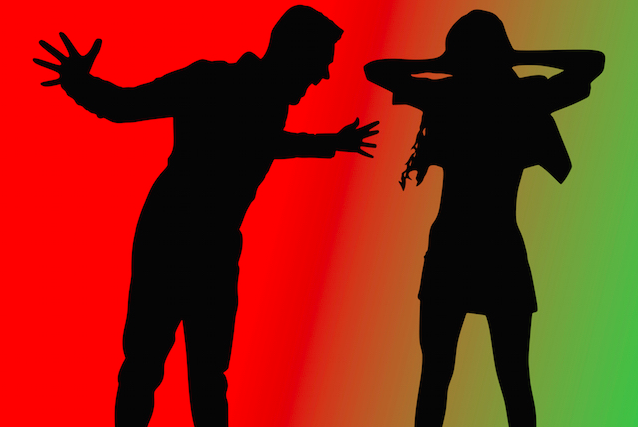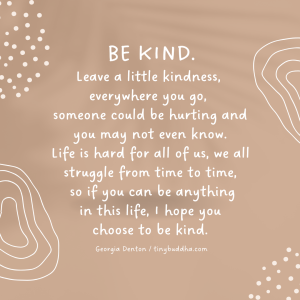
“Pain can change you, but that doesn’t mean it has to be a bad change. Take that pain and turn it into wisdom.” ~Unknown
Sometimes other people’s words can stir up very painful emotions in us.
Do you remember when you felt so disempowered by someone’s remarks that you froze on the spot and couldn’t think of anything to say back to them?
Or maybe you did say something, but it was so lame that you wished afterward you’d kept your mouth shut and just sucked it all up.
This happened to me recently when I was helping someone and, instead of gratitude, I received verbal abuse. I learned a valuable lesson from it that I would like to share with you.
When Words Make You Speechless
As part of my job, I provided home care for an elderly lady, and from day one I had a feeling we would clash.
She was eccentric, quick to judge, and unafraid about voicing her opinions. Being a timid person, I always tried to avoid conflicts with such people.
One seemingly unremarkable day, as I was finishing my duties at her house, I began to engage in small talk with her. I was stunned when she replied out of the blue, “You are so stupid! Your whole being, and the way you are!”
Within a split second I was swimming in negative emotions, so shocked that I literally froze in my tracks. I stood there in disbelief, unable to say a single word, wrapped in embarrassment and shame.
Then came the internal chatter. “How could she be so insensitive? Does she realize how hurt I feel? I should say something back, but I just can’t think what.”
From deep pain to personal empowerment
I walked away that day vowing never to feel so weakened by someone’s statements again.
I went over this episode in my mind, looking for answers. Within a few weeks, I no longer felt hurt. Instead, I had developed a new perspective—I needed this experience to resolve something within myself.
I have had similar incidents since then, and my reaction is now completely different. I’m freer and stronger.
You can be, too.
It can take a while, but determination and conscious effort will bring you the gift of a new perspective, just as it did for me.
Taking the Sting out of Insulting Words
Being verbally abused hurts. It’s perfectly natural to react defensively—but once the initial shock has worn off, here are six ways you can turn your reaction into something positive.
1. Allow yourself to ruminate in a healthy way.
It’s normal to replay upsetting events in your mind to get a handle on them. Done right, introspection is a valuable device for personal growth and empowerment.
Thoughts and images from a hurtful episode will pop up time and again as long as it still bothers you. So instead of suppressing them, allow them to surface. Observe them—but without obsessing and getting stuck in a mental loop.
Then, each time memories of the event surface, ask yourself if you are ready to let go of the shame that accompanies them. Think of this process as using an eraser; every time you rub away, the pain will start to fade and soon only a faint mark will remain.
2. Identify the other person’s (possible) motive.
In situations like this, convincing yourself you’ve done something wrong can be an automatic reaction.
Although you’ll never know for sure why someone gains pleasure from dishing out verbal abuse, you can make some educated guesses. Unless the person is a total stranger, you’ll have some understanding about them and you can figure out if they are intentionally malicious or just thoughtless and not worth wasting your energy on.
But don’t just rely on your own intuition—get a second opinion. Be a detective and quiz mutual acquaintances. They’ll likely share similar stories, and might even add insights that will help relieve more of your emotional burden. (This is not gossip—it’s for your own peace of mind.)
When I spoke to friends about my experience, I heard nearly identical tales of how this woman had bullied and intimidated others. I knew that bullies are usually suffering themselves, so these stories confirmed to me that she had acted from a state of pain herself, meaning that her words were not true reflections of me.
3. Turn the spotlight inward.
To better prepare yourself for the next time you are insulted, spend a little time reflecting on why you are so affected by the words of others in the first place. What beliefs do you hold that contribute to your reactions?
Think about how, in the heat of the moment, you are so swallowed up by emotions that you can’t think clearly. What creates this storm inside you?
For me this answer took a while, but I now think it was about pride—I felt my identity was under threat. I was attached to the idea that everyone should treat me kindly, so my world was shattered when someone didn’t.
Upon reflection, I figured I’d do myself a favor if I didn’t expect to be liked by everybody and instead embraced the possibility that conflicts might occur.
What beliefs do you hold that might be counterproductive to your emotional wellbeing?
4. Know what words really are.
Another thing I learned on this journey was that words by themselves are not harmful. It’s the meanings they carry that make them powerful.
Imagine having a conversation with someone who speaks a different language than you. Nothing the other person says to you makes sense. You look at them blankly, trying to piece some meaning together out of the jumble of sounds you hear. It wouldn’t matter if they were cursing or flirting—you wouldn’t know the difference.
So why is it that once you are aware of what these words mean, they have the potential to hurt? At some point you learned to associate words with meanings, but in reality they are just sounds. It’s up to you what you make of them.
5. Own your vulnerability.
Open your heart to the possibility of being wounded by others’ words. Life is never a smooth ride, and sometimes other people will hurt you with what they say. They may even render you silent when you’d rather stand up for yourself.
Remember that a small bump in the road doesn’t mean you’ve failed or that you have to hide. Accept that you sometimes won’t have the courage to act, but you can change over time.
The key, I’ve found, is slowly opening up. Share your true self with others. The more you admit your ”imperfections,” the more others will respect and accept you. Talking things over with friends, family, or even someone neutral makes you more human and relatable.
As researcher, author, and speaker Brené Brown has said, “Shame derives its power from being unspeakable.” Therefore, to prove your shame wrong, go out there and talk about it. After a while it will diminish and go away.
6. Resolve to speak up next time.
All this insight can help you deal with past insults, but what about the next time someone verbally attacks you? After all your reflection and internalizing the importance of bravery, will you be ready to stand up for yourself and fight back?
Sure enough, I didn’t have to wait too long for another round of insults by someone else. She was big, bold, and brash.
This time the stakes were higher—we were in the company of other people whom I knew and respected. And this woman didn’t just aim a word or sentence at me; it was an entire barrage of accusations intended to undermine my persona.
I waited until we were in private. Then I said my piece with real force and emphasis. The end result? She never treated me like that again. And I grew enormously in my own eyes.
You can do this, too.
Reclaim Your Inborn Power
We were all born with a perfect system to take on life’s challenges, be that running away from a tiger or standing up for ourselves.
If you believe you’ve lost the ability to stand firm in the face of insults, it’s never too late to get it back.
You’re perfect as you are now, warts, vulnerabilities, and all.
So don’t let a little wobble like someone’s words throw you off track. Take it in stride and remember they are just sounds that you are giving certain meanings to.
Because insulting words don’t just have the potential for hurt. They also have immense power to change your life for the better.
The question is, are you ready to use the verbal attacks of others as fuel for personal growth?
I was a timid person and I did it—so I know you can, too.
Man yelling image via Shutterstock
About Andrea Still
Andrea is a recent environmental graduate, and she's equally fascinated by human nature and their mutual interconnection. She's enthralled by personal development and is the voice behind the popular Instagram page @the_warrior_spirit. If you're finding life frantic, she's written a guide on Peace of Mind which you may find helpful.













 Though I run this site, it is not mine. It's ours. It's not about me. It's about us. Your stories and your wisdom are just as meaningful as mine.
Though I run this site, it is not mine. It's ours. It's not about me. It's about us. Your stories and your wisdom are just as meaningful as mine. 
Thanks for this, it came at the right time, where I am struggling to let go of the hurt because of what this lady said to me, ” that she had acted from a state of pain herself, meaning that her words were not true reflections of me.” this realization makes me feel much better, and I am glad I did not give response to her hurtful comments because I would have dragged my self to her level. Thanks Andrea 🙂
I’m so glad that my post helped you and that you were able to let go of the hurt. It’s very important in order to move on… 🙂
Wish you all the best!
Hi Andrea! Thank you for being so honest and for sharing your personal story. You are a real inspiration for growing and learning to stand up for yourself. Unfortunately, not all people are nice, and you are right that their motives might be different to what they actually say. May it be bitterness or being envious. Thanks again 🙂
Andrea,
Thank you for for this powerful reminder about the power of our words. Your courage is inspiring!
beautiful, heart-wrenching. You opened up and I get it – and will keep your words in mind when I’m hurt.
Very good post… It is so easy to be drawn into a verbal fencing match with just about anyone these days…Family, friends or even a signif. other. At times I would instigate these types of battles without knowing it b/c I could be pretty careless with the things I said. My biggest effort these days is to be mindful of what I say and just to be kinder. It’s a challenge and I still get into it with some folks, even online, but it’s good to have a resource like this to look at and see how someone else approaches something that is really so very common in the lives of us all.
This is so helpful, Andrea. I’ve been working with #3 for a while: Turn the spotlight inward. Your example of doing so was very helpful as well. I know that others’ words can’t hurt me unless they punch a still-raw place inside.
Thank You!
Thanks for sharing Andrea. Working with people can definitely be challenging, but on the flip side these challenges bring opportunities for personal growth. Good on you for recognising this and providing advice to others. All the best.
A great piece Andrea, It took me a while to adapt to #6.
Thanks for sharing, Andrea. Tip #2 is always the most helpful for me…people aren’t usually mean just to be mean. There’s something else going on (in their lives) that makes them try to regain control through negative thought and action. This is a lovely list and congrats on being stronger and braver!!
As a RN, I’ve faced this type of abuse countless times. Sometimes from the physicians and surgeons (who get 5-figure fines when they do). I’m not a psychologist, but from my experience and observations, people who sling verbal abuse seem to be desperate to display some kind of power or control. And as you mentioned, that desperation is very likely spawn from pain and fear.
The only other instance of verbal abuse I experience is from patients with dementia. Delirium from medication, lack of sleep, and Alzheimer’s is always a possibility with elderly patients. Especially when the sun goes down. We have a very technical name for it: “sun-downers syndrome” 🙂 . It’s very odd, but many elderly folks are dandy during the day, yet at sunset they are absolutely 100% confused and discombobulated.
Verbal abuse from dementia is much easier to dismiss.
Thanks for sharing this Andrea.
When I moved across country I stopped coloring my hair and went gray. EVERY year when a “friend” visits she makes a point of telling me how she likes my hair better when colored (she’s 60 and dies her hair jet black, I’m 2 years younger). I always say “well I’m not going to color it again” and it totally ticks me off. Another friend told me next year I should respond with “Well, I’d like your hair better gray” to toss it back so she can hear how rude it is. I think I’ll do it, any thoughts?
Same here Ann – takes a lot of courage for sure!
Totally agree! I loved working with people and most of the time it was a positive and rewarding experience. But it can’t always be a smooth ride… Thanks Helen.
Stop being bothered by what other people say about your hair color.
People often have a hard time with change. It may also cause her cognitive dissonance since she continues to dye her own hair. She may feel implicitly judged by your action. This often happens when we make a positive change. Others who aren’t there yet feel “criticized” for not having made the same change.
The fact that this mildly inconsiderate and somewhat predictable comment “totally ticks you off” is is the problem, not the existence of the comment. It is impossible to create a world where there are never any such comments but possible to control our own reaction to them.
I personally think looking for an “equally hurtful snappy comeback” is probably perpetuating a cycle of hurting each other, rather than stepping out of it. You could ask her why she preferred it black and then tell her why you decided to stop dying it, in a kind way that does not come across as judging her. But she may still persist, which is not a big problem if you are comfortable with yourself and not overly attached to getting total approval from others.
What a great job you did Andrea, reaching that point where you could say enough, I can work this out.
My experience is that the people who are the most hurtful are the ones needing the most love. Not that it’s up to you to love them, unless you can do it safely from a distance and mentally think of them with compassion.
It’s a pretty challenging thing to do, deciding not to accept something you’ve put up with in the past, and brave to boot. Bravo to you for reclaiming your inner power.
Thanks for sharing, I know it’s been helpful to many who are struggling with confrontation.
Elle
It’s worth asking whether or not we even have been insulted. People with dementia cannot control what they say. Likewise, people with untreated mental illness often say things that merely express their own illness. Mental illness is often treatable, and some conditions that cause dementia are treatable, but for many people with dementia support is all we can offer.
Being bothered by the outbursts of people who literally cannot control their speech and would say the same thing to anyone is very much a reflection or our own insecurities. It is clear that such incidents reflect only the tragic condition of the other person.
When we have been unjustifiably verbally abused, it’s nearly always better to be effectively assertive and as compassionate as the situation allows. If it’s safe, it’s usually best to ask the other person to stop and explain why what they are doing is wrong. That may not always be possible, and taking a more intense step like discussing the situation with a supervisor or ending an abusive relationship may be necessary. Of course failing to engage the other person is suboptimal but if the person’s actions are so abusive that engaging is ruled out, or if they won’t allow engagement, or repeat the behavior, it may be necessary. However, we should not look for excuses not to engage. Usually the very best solution is to give the other person a chance to see how you were impacted.
# 3, about preparing, is what I do, and in situations like these, I determined that the best thing for me to do is keep my mouth shut. This way, I know I won’t say something hurtful or that I may regret later because the pain that results from hurting someone and regret is greater than that experienced at the moment. I also know that once I reflect upon the situation, I will rid myself of the pain and get my inner peace back.
Too many times we carry with us the hurtful things people have said. They’ve said them to us only once, but we re-wound ourselves each time we think about the situation and say, “If only I had said . . . or done . . . this!”
Learning to ruminate in a healthy way is a much better alternative – thanks for sharing and showing us how we can learn to step back and make better choices for our well-being.
Thank you for sharing your experience, Andrea. I still hold on to insults from my years as a teacher (most were from the parents, not the students). It’s frustrating to know that I am still giving them power over me, when they don’t remember I exist. In all of these memories, I regret not standing up for myself. But that is over. I’m embracing #6!
There aren’t many women who are good at standing up for themselves because of the way we’re raised, and I’m pleased as punch that you worked through your shame and got to a place where you can do so. I used to internalize every harsh word, every disdainful look, anything a person could possibly do to offend. It took time to learn how to differentiate constructive criticism from nastiness, become Teflon when necessary, and count on myself to say what needed to be said. It’s like a muscle. You use it, it gets stronger.
I had a friend who used to talk about buttoning up her vest when she was feeling attacked, and that was a real handy metaphor for me. Perhaps it will be of use to others…
Thank you for the post Andrea.I know people like that who take pleasure in verbal assaults.And it does bother you.I know i have grown since and try not to take it personally.But time to time it pops in your head and I don’t know how to stop that movie.But I am getting better at it not to let it get to me.
What lovely comment Therese – thank you! I’m glad that it was helpful to you. 🙂
Thanks Cylon, I equally admire your courage too… 🙂
Hi Ilka, appreciate your kind words! It’s not easy to share something so personal, but I now recognize these are the kind of stories that will help others most. Brene Brown’s words bring it home again: “Vulnerability is courage in you and weakness in me.”
With gratitude,
Andrea
Thank you for your comment Bigdo. Love the way how you called it ‘verbal fencing match’! I know what you mean by being careless about what we say as well, since we all have different perspectives on life and the meanings we assign to what we hear. It can be difficult to judge sometimes how the other person will take what we have to say! But it’s probably a safe bet trying to be kinder first and without jumping to conclusions.
This is a great post Andrea. My Dad and I used to have a saying ‘it’s not about you, it’s all about them’ for situations like this – as you say in number 2, you never know what the other person has going on, and their mental model of the world has come from the way in which they have been brought up, and the way in which they think it’s ‘right’ to interact with the world – which may be very different from our own (very!!).
I keep that phrase in my head when other people are insulting and challenging, and try (though I’m still working on it) to respond with love whilst keeping assertive and firm boundaries myself. You seem to have grown hugely from this experience, I hope I have the courage to do the same the next time I face this kind of situation.
My opinion? Don’t play the same game she does…..give her a dose of boundaries. It’s your hair not hers- it’s really none of her business how you chose to dye your hair, do your make up/not wear make up, shave your pits, etc 😉
Hi Blaine,
I think you really nailed it with your observation of how the need for power and control can create these scenarios, in any kind of social setting. Dementia certainly explains a lot too, and I have experienced those sorts of outbursts – which are a lot easier to handle emotionally. The snag is when they are perfectly aware of their actions and their hurtfulness!
What I have definitely learned from this experience was to think about why I was offended by this person (and others in the past), to step away from the situation and to fight back if necessary.
For some, understanding, processing and dealing with verbal strikes on the spot comes easily. For others, it takes years just to have the courage to admit it’s even happened and the need to do something about it. The good news it’s never too late to start working on it…
Your insights are appreciated 🙂
That’s great Susan and thank you for your feedback. Words are just words in the narrowest sense but the meaning we assign to them operate at a very deep, subconscious level. Let’s keep working on this!
Aw Ashley, I appreciate your comment. I don’t believe either that people are mean for the sake of it; rather they usually have their own agenda. Thanks for reading and commenting…
Hey Beth, you could respond in various different ways, depending on what the relationship with this friend means to you, and where you’d like to see it go. If it is important to you, maybe you could give her your most genuine smile and make a light hearted/humorous remark about how the natural look is in fashion right now and even some famous people are advocating it. On the other hand, I’d be wary of calling people friends when the feeling I get in their presence is that they find it difficult to accept me the way I am! Something to think about…
Hey Andrea – what a lovely post. I learned a long time ago not to take anything personally – your strategies are really spot on.
I am always very hurt and offended when hit with a verbal assault or criticism. It stirs up what I went through in childhood with my verbally abusive mother. I think this is why I am a little overly offended. Kind of like PTSD.
Thanks Elle for reading and for your insights. Yes, it was difficult to muster the courage to act like I did, but better now than never! 🙂
Thanks Harold. Just to expand a little on the story, I did express to this lady how her comment effected me after I recovered from the shock on the spot. She did not show remorse at the time but when I met her again later, she did apologize for her behavior and treated me with more respect.
This event inspired me to write about and share with others who may go through the agony of not knowing how to respond in similar situations, regardless whether the insult came from people with mental illness or not. Believe me, they have the power to ruin people’s lives.
Great post! That is a challenge for sure, thank you for the wonderful insight from your journey to well-being! Gave me more to ponder! 🙂
Brene Brown says this kind of response is fighting shame with shame….she recommends against it. It leaves you feeling gross and possibly even more ashamed. I think your hitherto response is honest, direct and matter-of-fact. Stick with that then find a REAL friend who you can talk through how hurtful/angry/shameful you find her comments. I have a “friend” who comments on my weight and I think I need to take my own advice 😉
Many people with mental illness simply cannot control what they say for do. For many people in this situation, treatment for their illness is the only thing that can help them.
This is not a trivial issue. Mentally ill people often say things that are extremely insulting and controversial, because of their illness. They are sometimes violently attacked as a result. It is unfair to judge people in the throes of mental illness.
It is wonderful if the person you interacted with was functional enough to apologize, but not everyone is doing that well.
There is a great deal of misunderstanding of mental illness. It is very hard for those of us who do not experience such things as delusions and compulsions to grasp how overwhelming this experience can be.
In fact, anger is a “high”, and we tend to look for reasons to give in to it.
Insults do have the power to hurt, and possibly ruin peoples’ lives. Certainly we should be assertive when people who can understand better insult us.
At the same time, ultimately, only we can choose to allow ourselves to be insulted. It is not an argument against self-respect to note that, as well as being compassionate but assertive, we should also love ourselves. There will always be insults, often random, sometimes in situations that we can’t do anything about, such as from random people in traffic or people who plan an insult to occur as we are leaving. So part of the solution is, indeed, to evaluate whether they are worth responding to.
I also find that trying to stay calm and courteous often allows the insulting person to see for themselves that they are in the wrong. Often, people are upset by something that has nothing to do with us, that we don’t know about. In these cases, it is common for them to apologize for their behavior even if one does not respond with anger. If anything it may be more common for this to happen if one does not respond with anger.
I used to take everything personally. Then I had the insight that virtually none of what I was taking personally was personal at all.
Ultimate post. This is very hard to practise. I need to follow these principles. It happened to me today, when my manager schedule a session without asking me for a training and i had to leave my mom to airport at the same. He did not like to reschedule as his ego would be hurt. He commented very harsh and racist words on my mother , my nationality . I also lost control and commented on his professional behaviour in front of everyone. Later i realized, i should have confronted him in private.
It is very hard to control that surge when such situation happens
57$/hour@tinybuddhat
>/
I’ve been working online for quite some time now, by doing various simple jobs that only require a PC and internet access and it’s the best job i ever had… After 6 months on this job and i earned total of $36,000… Basicly i get paid close to 80 dollars each hour and work for 3 to 4 hrs on daily basis.And the best part about this job is that you can work when it’s convenient to you and the payments are weekly
Thats a hard one, to learn how to react positively when attacked..with some people it can take years of therapy to get to that place but, you gave some very good advice to getting there on our own
like me coming …. < Start working at home with Google! It’s by-far thss best job I’ve had. Last Wednesday I got a brand new BMW since getting a check for $6879 this – 8 weeks past. I began this 8-months ago and immediately was bringing home at least $181ACper hour.
I work through this link………
>/
Hi Andrea. Thanks for the
great perspectives on what is a very uncomfortable, confronting and
tongue-tying situation when being bullied… The bulling can be subtle
which makes it trickier to pin point and speak up in response. I’m currently discovering
where I am allowing subtle bulling to go on in my life. It is great to finally
understand and decide to call it for what it is. As you say bulling and hurtful
words are not to be taken personally and as a reflection of who we are. What I
have discovered as part of claiming myself back from being engaged in the
first place is that the behavior isn’t who they are either. As it comes from
their hurts and pains of the past they are just using tactics to continue to
mask their own feelings. Understanding this supports me to keep my heart open
to them and stand supporting myself and breathing gently as they vent the
energy they have chosen to act upon. I’m also developing the understanding
that I can say no to being engaged when they are agitated and unsettled. As an
adult I have total choice over how I allow another person to speak to me and
treat me. No one has more authority over me than I do and now I choose to
exercise my own authority every time.
Extra 81$ daily@@ tiybuddha
>/
I want to thank you for sharing your story, Andrea, and what you did took a lot of courage. It amazes me how others can get away with so much drama, by inflicting pain on those that were trying to help them. Although we’re all imperfect human beings, disrespect isn’t something that should be tolerated-especially from those that are battling their own demons.
There are times when I don’t have a choice but to call someone out on their actions. For example, my ex-best friend of twenty years started accusing me of disrespecting his girlfriend and started to call me every horrible name in the book. He couldn’t handle the situation like an adult, and didn’t bother trying to get my side of the story. If he was more mature, he wouldn’t have to take sides. In order for me to move forward with my life, I had to unfriend him Facebook, delete his phone number and email addresses. Besides, I’m doing fine without him.
It’s okay to stand up for yourself, even if no one agrees with you. Respect is a two-way street, and it’s important to treat others the way you want to be treated.
HHHHHHHHHHHHHHHHHHHHHH
Gosh Andrea, your post is truly inspiring. Not just with the strategies you’ve included but with your own story too – I know you describe yourself as a quiet person so standing up to someone who had the lack of respect to be verbally abusive in mutual company, well, that is a strong testament that your ideas above are going to work. That’s fantastic. I love #3 ” I was attached to the idea that everyone should treat me kindly, so my world was shattered when someone didn’t….. I figured I’d do myself a favor if I didn’t expect to be liked by everybody and instead embraced the possibility that conflicts might occur.” – it’s amazing how painful it can be when another chooses not to like us even though we are all individuals and the chance of our many aspects and facets of our characters always gelling, is unlikely. Great post Andrea, thank you.
“The key, I’ve found, is slowly opening up. Share your true self with others. The more you admit your ”imperfections,” the more others will respect and accept you.” That’s indeed what it’s all about! I can’t say I’ve ever been verbally abused but I’ve definitely been used, shoved aside and emotionally abused and it all applies…there’s no use in hiding…not from yourself and not towards others. Thank you for sharing this beautiful story!